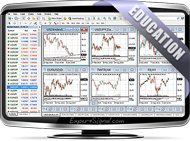Relative Strength Index (RSI)
◙ Primary Use: Identifying Overbought/Oversold Markets
◙ Trading: Trading RSI Readings | Trading Slope Divergences
◙ Standard Settings: 14 Periods (we recommend 21 periods)
![]() Introduction to RSI
Introduction to RSI
Developed by Welles Wilder, the Relative Strength Index (RSI) is a momentum oscillator that measures the velocity and magnitude of directional price movements. The RSI is well-known for identifying overbought and oversold markets and generating trading signals.
![]() Calculating RSI
Calculating RSI
■ RSI = 100 – 100 / ( 1 + RS)
Where,
RS = Average Gain / Average Loss
■ First RS calculation:
Average Gain = Summary of Gains for 14 periods / 14
Average Loss = Summary of Losses for 14 periods /14
■ Second RS calculation:
Average Gain = [(previous Average Gain) * 13 + current Gain] / Average Loss = [(previous Average Loss) * 13 + current Loss]
■ Same procedure for the third and the subsequent RS
![]() Trading with RSI
Trading with RSI
RSI can be used for multiple purposes:
-
Identifying overbought/oversold markets
-
Trading signals based on RSI readings
-
Trading signals from slope divergences (price chart slope vs RSI slope)
As suggested by its developer, the default RSI period is 14, but we recommend using 21 periods.
As suggested by its developer, the default RSI calculation is involving 14 periods, but we recommend 21 periods.
Identifying Overbought/Oversold Markets
□ In a ranging market, when RSI is above 70, the market is considered overbought
□ In a ranging market, when RSI is below 30, the market is considered oversold
□ In a downtrending market, RSI = 60 is considered overbought
□ In an uptrending market, RSI = 40 is considered oversold
Recommended Timeframes:
-
Short-term: M5 (RSI(21) on M5 can serve as an excellent intraday signaling tool)
-
Longer-term: H1, H4, and D1

![]() RSI Intraday Strategy and Trade Signals
RSI Intraday Strategy and Trade Signals
RSI can be an effective tool for day trading, provided certain conditions are met. The following system has been tested for years and has proven reliable.
Strategy Setup
-
Trade only liquid major pairs (EURUSD, USDJPY, GBPUSD, USDCHF, USDCAD, EURGBP); avoid Forex Minors and Crosses
-
Avoid trading around major news releases
-
Set RSI to 21 periods
-
Apply RSI(21) to the M5 chart
-
Focus on short-term trend reversals after strong price movements
-
Target 5–20 pips with a reward/risk ratio of at least 3:1
-
Trade triggers are based on RSI readings and adjust to market conditions (trending or ranging)
-
In trending markets, trade in the direction of the trend only
-
In ranging markets, confirm entries with price divergences
Trade Signals
Trending Markets
(↑) Go long if RSI drops below 40 and then rises back above it (trend direction only)
(↓) Go short if RSI rises above 60 and then drops back below it (trend direction only)
Ranging Markets
(↑) Go long if RSI drops below 30 and then rises back above it (with the first trough below 30)
(↓) Go short if RSI rises above 70 and then drops back below it (with the first peak above 70)
Money Management
-
Reward/risk ratio of at least 3:1
-
Target 5–20 pips
-
Use a trailing stop instead of a fixed stop
![]() Platform Setup
Platform Setup
You can install the 'RSI' directly in MetaTrader-4 or MetaTrader-5:
□ GO TO → INDICATORS → OSCILLATORS → RELATIVE STRENGTH INDEX
□ STANDARD SETTINGS → 14 PERIODS
StochRSI and DTosc
![]() Introduction to StochRSI and DTosc
Introduction to StochRSI and DTosc
StochRSI, created by Tushar Chande and Stanley Kroll, is an oscillator based on RSI—essentially an “indicator of an indicator.” It increases RSI’s sensitivity and generates more trading signals than the standard RSI.
![]() Calculating the StochRSI
Calculating the StochRSI
■ StochRSI = (RSI - Lowest Low RSI) / (Highest High RSI - Lowest Low RSI)
StochRSI measures the level of RSI compared to its high-low range and fluctuates between the values zero (0) and one (1).
|
RSI |
StochRSI |
|
|
Overbought |
Above 70 |
Above 0.8 |
|
Oversold |
Below 30 |
Below 0.2 |
The StockRSI center line is at value = .50
-When StochRSI is above 0.50, it reflects an uptrend
-When StockRSIis is below 0.50, it reflects a downtrend
StochRSI Interpretation
For RSI=14 periods, here are some interpretations for StochRSI::
- StochRSI = 0.0 {RSI is at its lowest point for 14 days}
- StochRSI = 0.2 {RSI is near the low of its 14-day high-low range}
- StochRSI = 0.5 {RSI is in the middle of its 14-day high-low range}
- StochRSI = 0.8 {RSI is near the high of its 14-day high-low range}
- StochRSI = 1.0 {RSI is at its highest point for 14 days}
![]() Trading with the StochRSI
Trading with the StochRSI
Trading with StochRSI
■ Buy Signals
-
Occur when StochRSI crosses above the oversold level (0.2)
■ Sell Signals
-
Occur when StochRSI crosses below the overbought level (0.8)
Smoothing the StochRSI
Due to its volatility, StochRSI can be smoothed using a short-term moving average. A 10-day Simple Moving Average (SMA) of StochRSI helps identify the trend:
-
10-day SMA of StochRSI above 0.50 → Uptrend
-
10-day SMA of StochRSI below 0.50 → Downtrend
Multi-Timeframe Confirmation
Use multiple timeframes to confirm StochRSI signals:
-
M15 signals on H1 timeframe (intraday)
-
D1 signals on W1 timeframe (swing)
-
W1 signals on MN1 timeframe (long-term)
Use the larger timeframe to define the trade direction and the smaller one for entry signals.
StochRSI Conclusions
StochRSI generates more signals than the standard RSI. However, due to its volatility, it should be confirmed with other tools such as Price Pattern Recognition, Breakouts, or Volatility-Based Indicators.
DTosc Oscillator Based on StockRSI
DTosc, developed by Robert Miner, is another oscillator based on StochRSI. It is used to identify price waves and generate trading signals.
DTosc Settings:
The four values for DTosc are: {PeriodRSI, PeriodStoch, PeriodSK, PeriodSD}
-
Standard setting: 13,8,5,3
-
Other settings: (8,5,3,3), (21,13,8,8), (34,21,13,13)

![]() Platform Setup
Platform Setup
Here are some indicators for MetaTrader 4:
► https://www.mql5.com/en/code/11010
► http://forex-indicators.net/momentum-indicators/stochastic-rsi
You can find some StockRSI indicators for MetaTrader-5 here:
► https://www.mql5.com/en/code/541
► https://www.mql5.com/en/code/16844
■ Relative Strength Index (RSI), StochRSI, and DTosc
George Protonotarios, Financial Analyst
ExpertSignal.com ©
Read More at ExpertSignal » MACD » RSI » CCI » ADX » DeMarker » Awesome » Gator
■ COMPARE PROVIDERS
► Forex Accounts
► Trade Signals
► Crypto Exchanges
► Volume indicators
►Trend Indicators
■ OSCILLATORS
» INTRODUCTION
» Momentum
» RSI PRECISION









